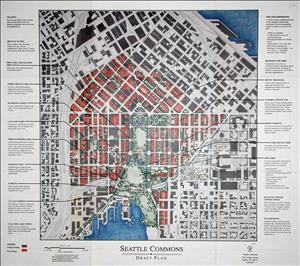On September 19, 1995, Seattle voters reject by a 47 to 53 percent margin a $111 million property-tax levy that would have funded the development and construction of the Seattle Commons. Designed as a 61-acre park stretching from downtown Seattle to Lake Union, the Seattle Commons has been envisioned as a vast civic lawn framed by high-tech laboratories, condos, restaurants, and urban amenities.
Seattle architect Fred Bassetti and Seattle Times columnist John Hinterberger first proposed the idea for the Seattle Commons in 1991. Creation of the Commons would have displaced about 130 existing small businesses within the project's footprint, but was expected to draw high-tech industries and result in the creation of some 12,000 new jobs in Seattle.
Battle Lines
The battle over the Seattle Commons pitted supporters such as Seattle Mayor Norm Rice (b. 1943), billionaire Paul Allen (1953-2018), and a widely diverse group of supporters against small business owners and Seattle residents who did not view the park and extensive redevelopment in South Lake Union as a high priority for public funding. Supporters raised some $900,000 in cash and in-kind contributions. Donors ranged from individuals at the $25 level to corporate donors giving $25,000. Paul Allen had loaned the Commons measure $20 million to buy land within the proposed park's boundary and promised late in the campaign that if the levy passed his loan would be forgiven. Billionaire Bruce McCaw donated a reported $100,000. Opponents of the bill raised $500,000.
At the time of the vote, the levy was projected to cost Seattle homeowners and average of $48 extra in property taxes each year over the levy's nine year term.
Voter turnout was unusually high for an off-year primary election. Of Seattle's registered voters 45 percent went to the polls and 50,000 requested absentee ballots. In addition to the Seattle Commons levy, voters were asked to fund construction of a new baseball-only stadium for the Seattle Mariners. (That levy failed by a narrow margin, although the stadium was built after the state legislature brokered a controversial funding solution.)
The Day After
The morning after the levy's defeat Mike Foley, a spokesperson for a group called the Seattle Commons Opponents Committee, told the Seattle Post-Intelligencer, "It's obvious the people of the city see it like we do -- that there are more important things in the city than the Commons" (September 20, 1995, p. 1). Rudy McCoy, another of the levy's opponents, stated his opinion that "It would be a place for the rich and poor paid for by the middle class."
A poll conducted by The Seattle Times found that voters who went downtown at least once a week generally supported the levy, and those who did not opposed it. Younger voters and those with higher education levels supported it. Support also rose with income level. Most of those polled described their choice as an easy decision.
Winds Of Change
Despite the levy's defeat, the winds of change were already blowing through South Lake Union and the proposed Commons area. Fred Hutchinson Cancer Research Center had located its headquarters near the proposed Commons in 1993 and was in the process of adding property to its campus. REI's flagship store was under construction nearby. The South Lake Union neighborhood was in the midst of a painful evolutionary process as its many commercial laundries, light manufacturing facilities, sawmills, and similar industries that had defined the neighborhood's character gave way to more modern usage. Many commercial structures were drifting into disrepair and much of the area's quaintly charming housing stock was aging poorly due to inferior construction materials and lack of maintenance.
Seattle Commons supporters, not easily dissuaded, succeeded in placing a second version of the Seattle Commons on the May 21, 1996, ballot. That measure also failed by a narrow margin. Paul Allen, preparing to take control of the 11.5 acres that Commons supporters had purchased with the money he had loaned, issued a statement reading, "Although I'm disappointed this measure did not pass, I respect the voices of the voters who have defeated the Commons. My loan to the Seattle Commons will not be renewed, and I will be moving ahead with other projects and investments for those funds" (The Seattle Times, May 22, 1996).

